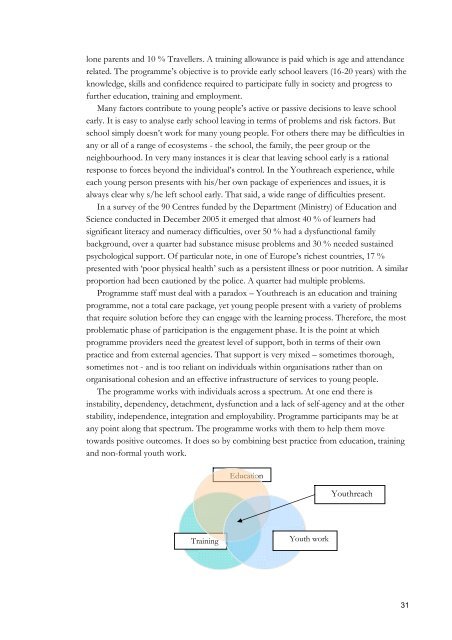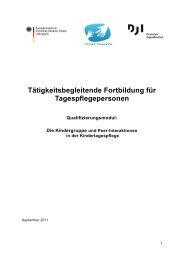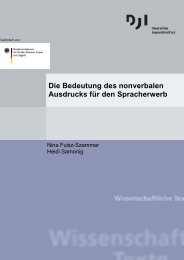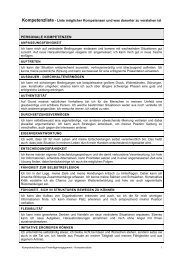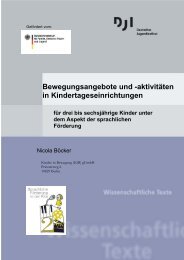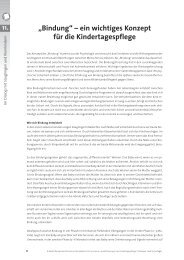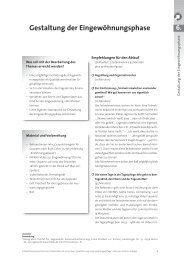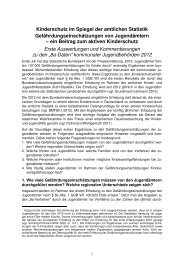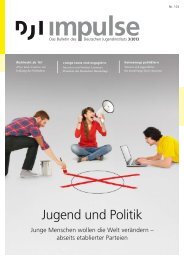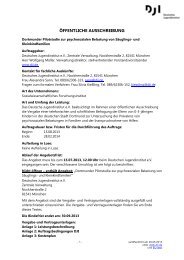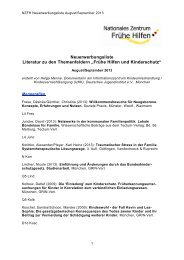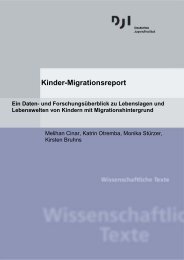download - Deutsches Jugendinstitut e.V.
download - Deutsches Jugendinstitut e.V.
download - Deutsches Jugendinstitut e.V.
You also want an ePaper? Increase the reach of your titles
YUMPU automatically turns print PDFs into web optimized ePapers that Google loves.
lone parents and 10 % Travellers. A training allowance is paid which is age and attendance<br />
related. The programme’s objective is to provide early school leavers (16-20 years) with the<br />
knowledge, skills and confidence required to participate fully in society and progress to<br />
further education, training and employment.<br />
Many factors contribute to young people’s active or passive decisions to leave school<br />
early. It is easy to analyse early school leaving in terms of problems and risk factors. But<br />
school simply doesn’t work for many young people. For others there may be difficulties in<br />
any or all of a range of ecosystems - the school, the family, the peer group or the<br />
neighbourhood. In very many instances it is clear that leaving school early is a rational<br />
response to forces beyond the individual’s control. In the Youthreach experience, while<br />
each young person presents with his/her own package of experiences and issues, it is<br />
always clear why s/he left school early. That said, a wide range of difficulties present.<br />
In a survey of the 90 Centres funded by the Department (Ministry) of Education and<br />
Science conducted in December 2005 it emerged that almost 40 % of learners had<br />
significant literacy and numeracy difficulties, over 50 % had a dysfunctional family<br />
background, over a quarter had substance misuse problems and 30 % needed sustained<br />
psychological support. Of particular note, in one of Europe’s richest countries, 17 %<br />
presented with ‘poor physical health’ such as a persistent illness or poor nutrition. A similar<br />
proportion had been cautioned by the police. A quarter had multiple problems.<br />
Programme staff must deal with a paradox – Youthreach is an education and training<br />
programme, not a total care package, yet young people present with a variety of problems<br />
that require solution before they can engage with the learning process. Therefore, the most<br />
problematic phase of participation is the engagement phase. It is the point at which<br />
programme providers need the greatest level of support, both in terms of their own<br />
practice and from external agencies. That support is very mixed – sometimes thorough,<br />
sometimes not - and is too reliant on individuals within organisations rather than on<br />
organisational cohesion and an effective infrastructure of services to young people.<br />
The programme works with individuals across a spectrum. At one end there is<br />
instability, dependency, detachment, dysfunction and a lack of self-agency and at the other<br />
stability, independence, integration and employability. Programme participants may be at<br />
any point along that spectrum. The programme works with them to help them move<br />
towards positive outcomes. It does so by combining best practice from education, training<br />
and non-formal youth work.<br />
Education<br />
Youthreach<br />
Training<br />
Youth work<br />
31


